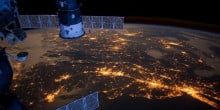NASA is sending worms in outer space. This might sound like a plot from a Sci-Fi movie, where everything soon goes into disarray, and the worms start eating the astronauts or something similar. But it’s for a good cause. Scientists will send worms to stop astronauts from losing weight.
Most of us don’t know this, but an astronaut’s physiology can change in space. Their whole physical structure from weight to height can fluctuate while they are in space. Astronauts can lose up to 40 percent of their weight during a 6-month space mission.
This can make astronauts physically incapable of doing their job. These worms are so tiny that they can only be seen under a microscope. The microscopic worms are called C. elegans and are fascinating specimens.
These remarkable “creatures” share some of the vital characteristics as homo sapiens do. In other words, they are part human. This is a good thing, believe it or not. The worms assist in demonstrating some of the ways space can affect muscle and the ability to utilize energy.
This experiment is being carried out by British scientists from Exeter and Nottingham universities and was initiated on 5th December 2018. The worms will be sent to the International Space Station from the Kennedy Space Centre in Florida, USA.
The space station is in orbit around the Earth at a distance of between 205 and 270 miles away. The worms will start multiplying in space, and after growing to adults, in around 6.5 days, they will be frozen and then sent back to Earth.
This is a very vital experiment as I said earlier. It will help scientists figure out why or how astronauts undergo certain physical changes while they are in space. This experiment will also figure out health problems on Earth. This research could even result in new treatment options for diseases such as diabetes.
Space missions are a good depiction of how accelerated aging occurs and the rate at which humans age is connected to a phenomenon known as “insulin signaling.” It is how insulin increases the uptake of glucose into fat and muscle cells. As humans age, our metabolism slows, and so our bodies become less efficient at metabolizing glucose.
If scientists can figure out how spaceflight affects the aging process, they can use more specific treatment options for patients. Targeted interventions such as drugs will help slow or prevent muscle atrophy from occurring in astronauts.
The researchers will use mutant worms. These mutant worms have a more sensitive response to glucose. They have a high or low uptake of glucose into their muscle cells and can help calculate how their muscles are affected by space.
It’s because of such experiments that many companies that send experiments in space are popping up. Just think of Space Tango, the startup from Lexington Kentucky that is helping scientists grow cannabis plants and its byproducts aboard the International Space Station.
The project is a proper collaboration, and actual team effort went into it. It is supported by The European Space Agency, UK Space Agency, BBSRC, MRC, and Arthritis Research UK.




Share Your Thoughts